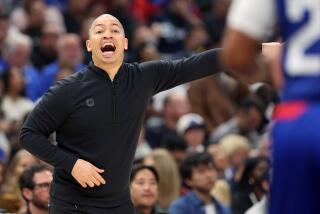Clippers say Mike Dunleavy defrauded them
- Share via
Finger-pointing. Allegations of fraudulent inducement. He said, he said.
Welcome to the Clippers vs. Mike Dunleavy.
The latest curious twist in the battle between the Clippers and owner Donald Sterling and the team’s former coach-general manager took a wild turn last week when the Clippers, trying to halt Dunleavy’s arbitration claim, alleged that Dunleavy fraudulently induced the Clippers into entering an employment agreement.
Dunleavy’s lawyer, in an interview with The Times on Thursday, said the lawsuit does not pass “the laugh test.” The Clippers quit paying Dunleavy when they fired him as general manager in March and he is owed $6.75 million on the remainder of his contract.
“It’s a pretty bold and reckless piece of strategy,” Miles Clements said. “But I think it’s just another delay tactic. From what I can see, that has been the Clippers’ pattern in the past when they don’t honor contracts of coaches they terminate.
“I don’t know if that’s been a good strategy for them in the past. I wasn’t involved in those lawsuits. But I do not expect it to be a good strategy for them in Mike’s case.”
Previously, Sterling and the Clippers sued 64-year-old Bill Fitch, who was fired as coach in 1998 with two years and $1.8 million left on his contract. They claimed he had not sought another job, and the suit was settled after a two-year legal battle.
Said Robert Platt, the Clippers’ general counsel, in a statement: “We welcome the opportunity to present our case at trial. This matter will be heard in the proper forum at the appropriate time. We are very confident that the evidence we present will inevitably result in a favorable determination.”
The Clippers’ lawsuit, filed last week in Los Angeles Superior Court, alleges that Dunleavy “had no intention to perform his duties and obligations as head coach through the 2010-11 season and knew these representations and promises to be false.”
In June, Dunleavy filed for arbitration before Judicial Arbitration and Mediation Services in Santa Monica, alleging fraud on the Clippers’ part during their contract negotiations.
Dunleavy stepped aside as coach in February in what was called a mutual decision and stayed on as general manager, navigating through the trade deadline and planning for a potentially busy summer of free agency. He was hired by the Clippers in 2003 and signed a five-year extension after the team reached the second round of the playoffs in the spring of 2006.
Court papers said the employment agreement was reached in December 2007.
Clements took issue with the theory of the lawsuit:
“Mike didn’t want them to pay him his full compensation under the contract. Why would anyone do that? If he did what has been done in other unrelated incidents, which is to jump teams, maybe at least there’d be a prima facie case to be made.
“But he’s unemployed. He stepped away and made them keep their money? So he could be unemployed? That’s nonsensical.”
lisa.dillman@latimes.com
twitter.com/reallisa
More to Read
Go beyond the scoreboard
Get the latest on L.A.'s teams in the daily Sports Report newsletter.
You may occasionally receive promotional content from the Los Angeles Times.







